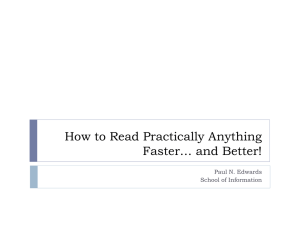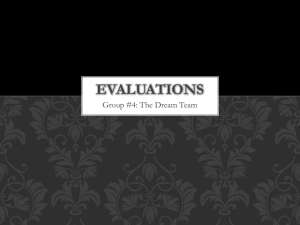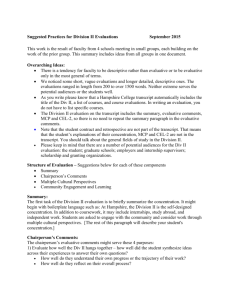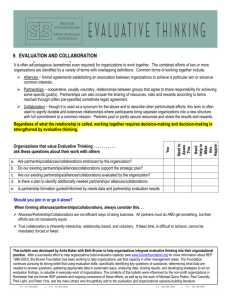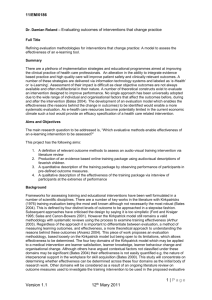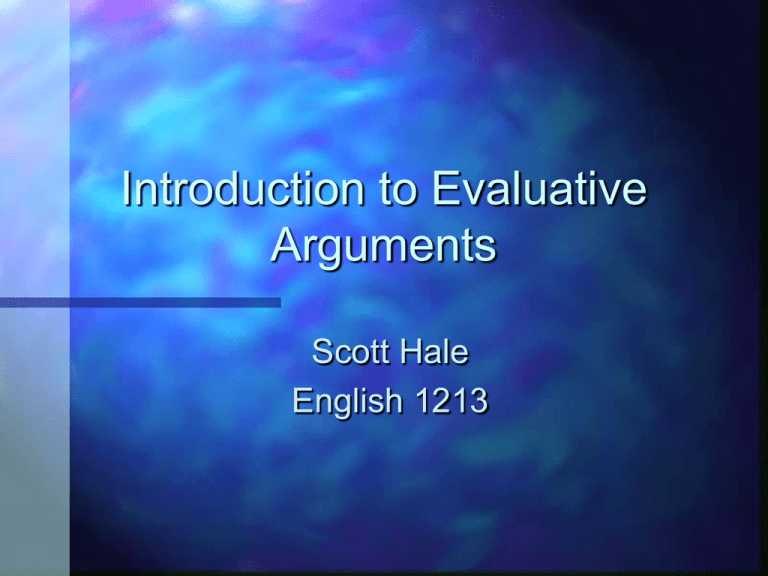
Introduction to Evaluative
Arguments
Scott Hale
English 1213
Definitional Arguments:
Basis of All Knowledge/Communication
Argue that Item X belongs in Category
Y
Scooter (X) is a murderer (Y)
Evaluative Arguments:
The next step in
Knowledge/Communication
Having defined an item--X is a Y
We then evaluate that item--X is a
good/bad Y…
Evaluations depend upon definitions
Requirements for
Evaluative Arguments:
Evaluations require
comparison/contrast between items
within the same category/genus
To argue that this is a good/bad chair
requires that we compare/contrast it
with other chairs...
AND...
Evaluative Arguments must be couched
in evaluative terms….
Adjectives...
Good/bad; effective/ineffective;
successful/unsuccessful; cooperative/
uncooperative; resentful/unresentful…
Flag Day is a joyous holiday...
Toulmin Schema:
Today is a beautiful day b/c it is sunny.
C: Today is a beautiful day
R: b/c it is sunny
G: Today is sunny; Ev: Support that it is
sunny today
W: Any day that is sunny is a beautiful
day
B: Support that beautiful days are
sunny
Strategy for
Constructing Evaluative
Arguments:
Construct convincing criteria for
evaluation...
Demonstrate that the evaluated item
possess those criteria...
Sunniness is the criteria for a beautiful
day
Today possesses that criteria
(sunniness)
Difficulties in
Constructing Evaluative
Arguments:
Demonstrating that the evaluated item
possess that criteria
(Synthesis/analysis)
Constructing convincing criteria…
Problems...
Problem of Standards:
Normal vs. Ideal:
Curfew...
Normal--12:00 Midnight
Ideal--Before sunrise
Problem of Mitigating
Circumstances:
Circumstances out of the
ordinary/Things we can’t control...
Revision Guides…?
Drunk?
Hit and Run?
Mitigating Circumstances revise criteria
Problem of 2 Goods vs. 2
Bads:
2000 Ferrari vs. 1979 Pinto?
2000 Ferrari vs. 2000 Lamborghini?
1979 Pinto vs. 1974 Nova?
Evaluating 2 Goods vs. 2 Bads revise
criteria
Problem of Seductive
Empirical Measures:
Statistics…
100% of College students drink on
Friday night…
100% of College students study on
Saturday night…
Control the numbers…
Problem of Cost:
What happen if the best costs too
much?
To enhance student learning, OU should
buy every student a laptop computer...
To teach effective birth control, every
student should have to have sex using a
condom…
Cost isn’t always about $$
Determining Criteria for
Evaluative Arguments:
Step 1: Determine the genus--too
broad/too narrow?
Step 2: Determine the purpose/function
of genus
Step 3: Determine criteria based upon
purpose/function
Step 4: Give relative weight to criteria-which is most important?


